Believing you have to look a certain way – and basing your worth accordingly – is the curse of Diet Culture. And mental health is both related to and affected by it.
Does the following sound familiar?

“I can’t eat anything with (fill-in-the-blank) in it. That food is bad. If I have even a taste, I will devour the whole thing. I have no control when it comes to (repeat the fill-in-the-blank).”
Personally, if I weren’t familiar with Diet Culture, I would wonder if “bad” refers to being rotten or past an expiration date. “Bad” as in spoiled? “Bad” like mixed with metal shavings or other contamination?

Or maybe food you stole, and the theft and its accompanying guilt make it bad?
Nope.
The fill-in-the-blank items are usually cookies, candy, chips, or whatever other foods you’re telling yourself are “bad” or that you “shouldn’t” have.
Actually, the fill-in-the-blank could be anything, from sugar to avocadoes to bread to anything not organic. There is no limit to which foods are deemed forbidden.
In fact, over time some foods have switched from the nice list to the naughty list and vice versa.
Coconut oil, nuts, and eggs have made the switch from bad to good (as in healthy).
Not so lucky, however, are foods like pasta, granola, and premade smoothies.
Just as with fashion, what is considered in-style changes often.
Where did we learn to think about food as fitting into two polarized (and moralized) categories? From our ancestors? Registered dieticians? School? Parents? Medical providers?
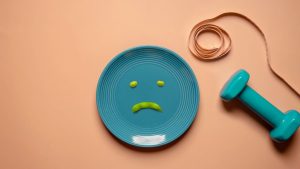
We learned it from what is generically called Diet Culture, which includes all the abovementioned influences, and more.
What is Diet Culture?
Diet Culture is a summary of myths and expectations pertaining to food and weight.
Its origins are in racism, patriarchy, thin-privilege, and colonialism.
In Diet Culture, restriction is normal and necessary. Even virtuous. Something to praise. And it has caused us to uphold a very narrow view of what is “healthy” and “good.”
It is also oppressive.
Whether it’s the latest Keto or Paleo diet, Intermittent Fasting, workout trends promising fast results, or a pill such as Wegovy, Diet Culture is everywhere. It is so pervasive that we don’t even realize how indoctrinated we are.
Oh, and by the way, Diet Culture’s effect on mental health is severe.
In Diet Culture, thinness is equated to health, and foods are categorized as good or bad based on their nutritional content. It’s all or nothing: Lettuce is good, cake is bad.
People learn through Diet Culture to define their own worth based on the foods they eat and their bodies’ cultural desirability. (Here in America, that desired look is often some version of a thin body with large breasts and buttocks, smooth skin, and long hair.)
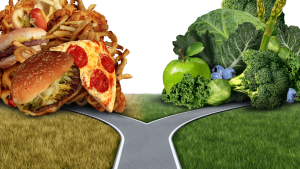
Eating in a Diet Culture-approved way (i.e. dieting) deems you superior to those who eat without rules.
Lettuce-eating people are thought to be good (i.e. virtuous, neat, and clean). Cake eaters are considered bad (lazy, gluttonous, disgusting).
Diet Culture prescribes a set of beliefs that equates thinness, muscularity, and certain body shapes with health and virtue.
It promotes weight loss and a smaller size as keys to happiness and success.
And it stigmatizes people who don’t fit into its narrow (pun intended) ideal.
Media, ads, fitness industries, and even healthcare systems contribute to Diet Culture. And much of the time they do so unknowingly and without malice. They are just part of the Kool-Aid-drinking masses.

Sometimes Diet Culture hides behind words and phrases like “wellness,” “clean eating,” or “healthy.” It’s all in an attempt to conceal itself from what it really is and ultimately remain powerful.
Regardless of what we call it — Diet Culture, wellness, clean eating — restriction is the default.
And, unless we think differently about food and bodies, Diet Culture tenets will continue to be followed and praised……as if they were some form of the 10 Commandments.
What is Restriction?
There are two types of restriction: mental and physical. And they usually co-occur.
Mental restriction
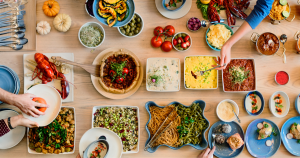
Mental restriction can be more difficult to identify, despite its powerful impact on everyday decisions.
Typically, mentally restricted thoughts involve “should” or “should-not,” good or bad, all or none. Thinking about food — what you should/shouldn’t eat and the anticipated results on your body — is often punitive.
The rules are so automatic in your mind that you may not even realize you have rules.
Diet Culture is everywhere — so much so that we may not even realize how indoctrinated we are.
Physical restriction
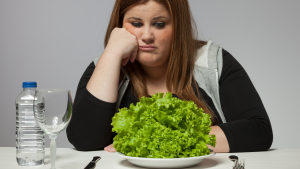
Physical restriction is limiting the amount of food you eat. This can be done through calorie counting, portion control, or cutting out certain foods or food groups. It is about following certain (albeit random) rules for “good health,” which is code for thinness.
Conversations about dieting and weight loss are common. They start at a young age and become internalized. (Cue the devil and angel on opposite shoulders.)
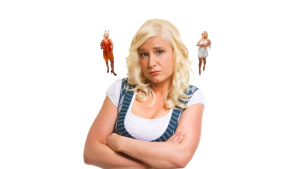
Avoidance of certain foods due to their nutritional content creates a preoccupation (aka mental restriction). And we all know that forbidden fruit tastes the sweetest.
So depriving oneself (aka physical restriction) only creates more desire for that very thing. Hence, restricted food tends to be what people choose if they overeat or feel a loss of control over eating.
Body Image and Diet Culture
Diet Culture and mental health become dangerously intertwined because of the damage done to body image. Diet Culture profoundly affects how we perceive, think, and feel about our own and other people’s bodies.
It also affects the behaviors we engage in or avoid as a result of how we feel about our bodies.

Diet Culture fosters attitudes of shame, disgust, and frustration by constantly presenting and glorifying unrealistic, often-unattainable body standards.
The out-of-reach standards lead to persistent dissatisfaction with our own bodies. Behaviors associated with body-loathing include seeking plastic surgery (e.g. tummy tucks, buttock implants), compulsive exercise, and dieting.
Social media plays a role in disseminating harmful Diet Culture messages and worsening body image.
(There is also data suggesting that, in limited ways, properly curated social media feeds can help with improving body image.)
Disordered Eating and Diet Culture
Physical restriction can take the form of fad diets, calorie counting, or cutting certain nutrients or food groups out of what you eat.
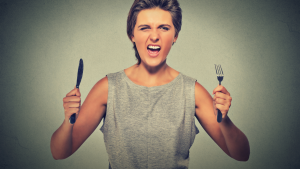
A common question is how to determine the difference between normal eating and disordered eating.
Ironically, Diet Culture’s definition of appropriate eating is a disordered one:
- “Food x is bad, and food y is good.”
- “I was bad today because I ate ice cream.”
- “I can’t eat anything until tomorrow because I ate my allotted calories for the day.”
These are all examples of disordered-eating beliefs.
Eating Disorders and Diet Culture
Diet Culture’s influence is especially dangerous because it contributes to the development, continuation, and exacerbation of eating disorders.

Anorexia nervosa, bulimia nervosa, and binge eating disorder are all severe conditions characterized by abnormal eating behaviors and preoccupation with body weight and shape.
Expectations or pressure to conform to the ideals promoted by Diet Culture can trigger or intensify eating disorders.
Even more common, however, are the disordered-eating behaviors promoted and caused by Diet Culture.
And mental health, in the process, gets attacked in an insidious, not-immediately obvious way.
Depression and Diet Culture

Obsession with weight and body image promoted by Diet Culture can also lead to depression.
When people are unable to achieve the physical ideals set by society, they feel a sense of failure and worthlessness. This is especially true for cis women, for whom societal pressures tend to be more intense.
Chronic dissatisfaction and self-criticism can spiral into depression: persistent sadness, loss of interest in activities, and feelings of hopelessness.
Anxiety and Diet Culture

Anxiety is another mental health issue closely linked to Diet Culture.
Constant worry about food choices, calorie intake, and exercise regimens is stressful. It therefore makes sense that fear of gaining weight or not meeting societal expectations can lead to chronic anxiety.
Panic attacks, obsessive behaviors, and social withdrawal are examples of Diet Culture’s link to anxiety.
Examples of Diet Culture in Everyday Life

Diet Culture rears its ugly head in many ways, often subtly embedded in daily routines.
Even when you are not “dieting,” you may be mentally and/or physically restricting:
- “I should not have eaten that.”
- “I will do an extra-long workout to burn this off.”
- “Tomorrow I won’t eat as much as I did today.”
- “It’s okay to eat this food in moderation, but every day would be too much.”
- “If I’m eating (enter forbidden food) right now, I should not eat it again later.”
- “I’ve already ruined this day of eating; I might as well start over tomorrow.”
Here are a few sources of Diet Culture information:

- Advertisements: Commercials and social media ads frequently feature products and services that promise weight loss and body transformation. The result? A reinforcement of the idea that our current bodies are inadequate.
- Social media influencers: Fitness and wellness influencers often promote restrictive diets and extreme exercise routines, presenting them as the key to happiness and success.
- Casual conversations: Comments like “I’m being good today by eating a salad” or “I need to burn off last night’s dessert” are common. Tragically, they reinforce the notion that food and body size are moral issues.
- Healthcare settings: Medical advice that focuses on weight loss as a primary indicator of health can perpetuate diet culture, ignoring other crucial aspects of well-being.
Breaking Free from Diet Culture
Recognizing and rejecting Diet Culture are essential for improving mental health.

Here are 4 steps to break free from its grip:
- Promote body neutrality: Embrace and celebrate diverse body shapes and sizes. Follow social media accounts that promote body positivity and unfollow those that perpetuate unrealistic standards.
- Practice Intuitive Eating: Listen to your body’s hunger and fullness cues rather than adhering to strict dietary rules. This approach fosters a healthier relationship with food.
- Seek professional help: If you’re struggling with body-image issues, eating disorders, or mental health concerns, seek help from a qualified therapist.
- Educate yourself and others: Learn about the harmful effects of Diet Culture. Share this knowledge with friends and family. Awareness is the first step toward change.
Diet Culture’s pervasive influence on mental health is very concerning. It’s not “just” a phase or trend to choose carrots over pizza every time. Nor is it “just” a phase to believe you are bad for wanting to eat pizza instead of carrots. (Truly being in the mood for a salad instead of pizza is also ok!)
The relationship most of us in this culture have with dieting impacts body image, eating disorders, depression, and anxiety.
Let’s challenge and dismantle harmful beliefs. Let’s prioritize mental well-being over societal expectations of appearance so we can all live happier lives.

Your worth is not defined by your weight or shape, but by who you are as a person. There is so much about you that is more important and interesting than your body size or shape.
Dr. Elayne Daniels is an anti-diet, Intuitive Eating-certified psychologist, consultant, coach, and author. She is passionate about helping people, especially HSPs, of all ages and genders recover and truly live their lives. In their own natural bodies!
Read more about disordered eating and body image here.
!
